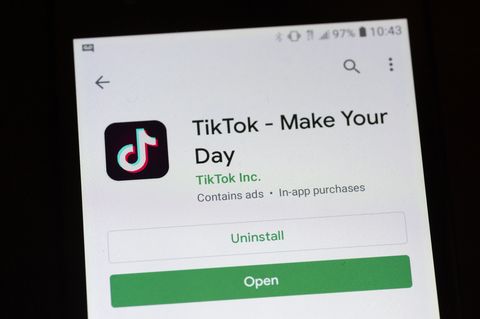- On Monday night, U.S. Secretary of State Mike Pompeo Fox News host Laura Ingraham that the Trump administration is considering banning Chinese apps, including TikTok.
- Pompeo cited security issues, saying the U.S. has already cracked down on other Chinese technology firms like ZTE and Huawei.
- The U.S. believes Chinese apps like TikTok transmit private data to the Chinese Communist Party.
The U.S. is considering a ban on TikTok—the wildly popular social media app where teens create and share short comedy clips, lip-sync videos, and dances—according to Secretary of State Mike Pompeo.
It’s part of a broader crackdown on Chinese-owned and operated technology due to national security concerns that companies are funneling user data to the Chinese government. So far, these claims are unsubstantiated.
Pompeo’s comments came during a Monday with Fox News host Laura Ingraham. When she asked Pompeo if the U.S. is considering a ban on Chinese apps, “especially TikTok,” he responded: “I don’t want to get out in front of the president, but it’s something we’re looking at.”
This content is imported from YouTube. You may be able to find the same content in another format, or you may be able to find more information, at their web site.
For precedent, Pompeo cited the Federal Communications Commission’s (FCC) move to designate two Chinese companies, Huawei and ZTE, as national security threats. In a June 30 , the FCC noted that officials could no longer use money from its $8.3 billion Universal Service Fund to “purchase, obtain, maintain, improve, modify, or otherwise support any equipment or services produced or provided by these suppliers.”
“With respect to Chinese apps on people’s cellphones, I can assure you the United States will get this one right, too,” Pompeo said, adding that U.S. citizens should only download TikTok “if you want your private information in the hands of the Chinese Communist Party.”
Banning TikTok
If the U.S. does take the step to ban TikTok, it won’t be the first country to do so. Last month, India banned 59 Chinese apps, including TikTok.
In a , India’s Ministry of Information Technology said it has received complaints from “various sources” about misuse of some iOS and Android apps for “stealing and surreptitiously transmitting users’ data in an unauthorized manner to servers outside India.”
Considering TikTok has seen over downloads in India—that means in theory, about half of the country’s 1.3 billion users have used the platform—the move was a staggering blow to the social media company. Globally, the app has some users.
Curiously, the Indian government never mentioned China by name in the release, though the apps—like Shareit, Kwai, and Baidu Map—all come from Chinese companies.
Meanwhile, in Australia, the government is considering a similar ban. Jim Molan, a senator from New South Wales, called the platform “a data collection service disguised as social media” in an interview with The Guardian Australia. Prime Minister Scott Morrison has also urged citizens to use caution in handing over their data through the app.
Lee Hunter, general manager for TikTok Australia, told The Guardian Australia the app does not share users’ data with foreign governments.
Chinese Espionage?
The vitriol toward TikTok—which Beijing-based ByteDance owns and operates—partially stems from accounts that the platform acutely invades the privacy of its users, potentially passing on data to the authoritarian Chinese government.
Back in April, a Reddit user operating under the handle posted an analysis of the social media app after reverse-engineering it, and has even started a subreddit channel called tiktok_reversing. Bangorlol contends that TikTok collects:
? Hardware IDs: Vendor-created strings of numbers and letters that connect a device to software. These can include MAC addresses used in Bluetooth and WiFi networking, CPU serial numbers, and hardware dongle identifiers. Usually, your software licenses are tied to
? Memory usage on your device.
? Apps installed on your phone.
? IP addresses: These serve as unique identifiers for your computer, tablet, or phone.
? WiFi access points.
? GPS pings.
Notably, TikTok does acknowledge some of this in its The company says it can “automatically collect certain information from you when you use the Platform, including internet or other network activity information such as your IP address, geolocation-related data … unique device identifiers, browsing and search history.”
Further, bangorlol says if anyone attempts to reverse-engineer or debug the app so that it, say, doesn’t that are displeasing to Beijing (which it currently does), the app will notice those actions and adapt to conceal its code. “They don’t want you to know how much information they’re collecting on you,” bangorlol wrote.
This content is imported from {embed-name}. You may be able to find the same content in another format, or you may be able to find more information, at their web site.
As Popular Mechanics previously reported, some of the discrepancy in privacy policy comes down to a fundamental difference in data governance between the U.S. and China.
“China has a very different legal framework and perspective on the rule of law,” Andrea Little Limbago, chief social scientist at the encryption and privacy company Virtru, told Popular Mechanics last year. “TikTok claims they do not store data in China, but this is difficult to validate.”
If you absolutely must use the app because you can’t get enough of the viral dances, food hacks, and grandma pranks, you should be doubly careful in enabling permissions. Does the app really need permission to use your camera or microphone if you’re just watching videos? Probably not. Use common sense.
This content is created and maintained by a third party, and imported onto this page to help users provide their email addresses. You may be able to find more information about this and similar content at piano.io
This commenting section is created and maintained by a third party, and imported onto this page. You may be able to find more information on their web site.






Recent Comments